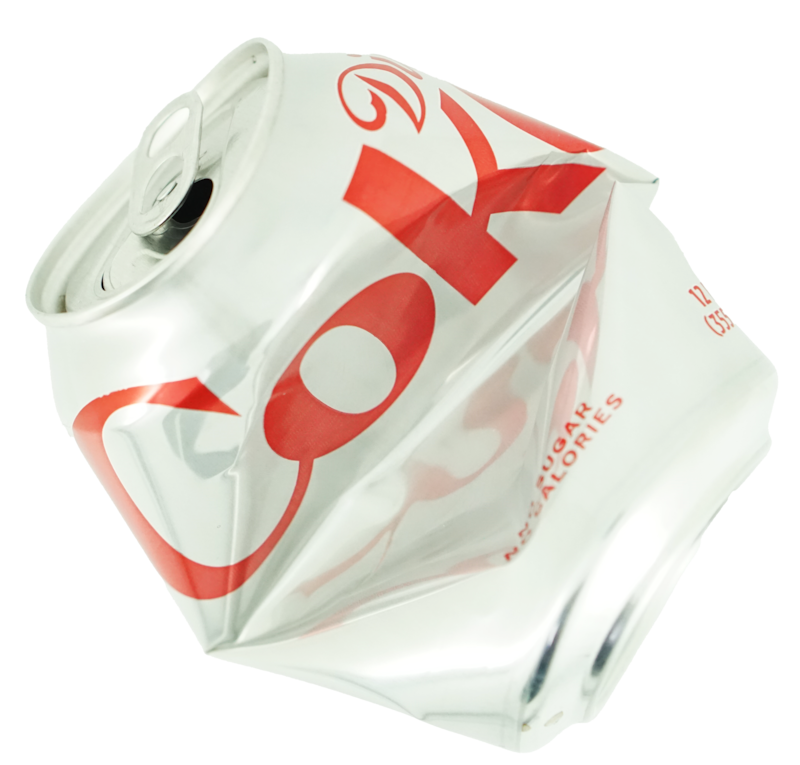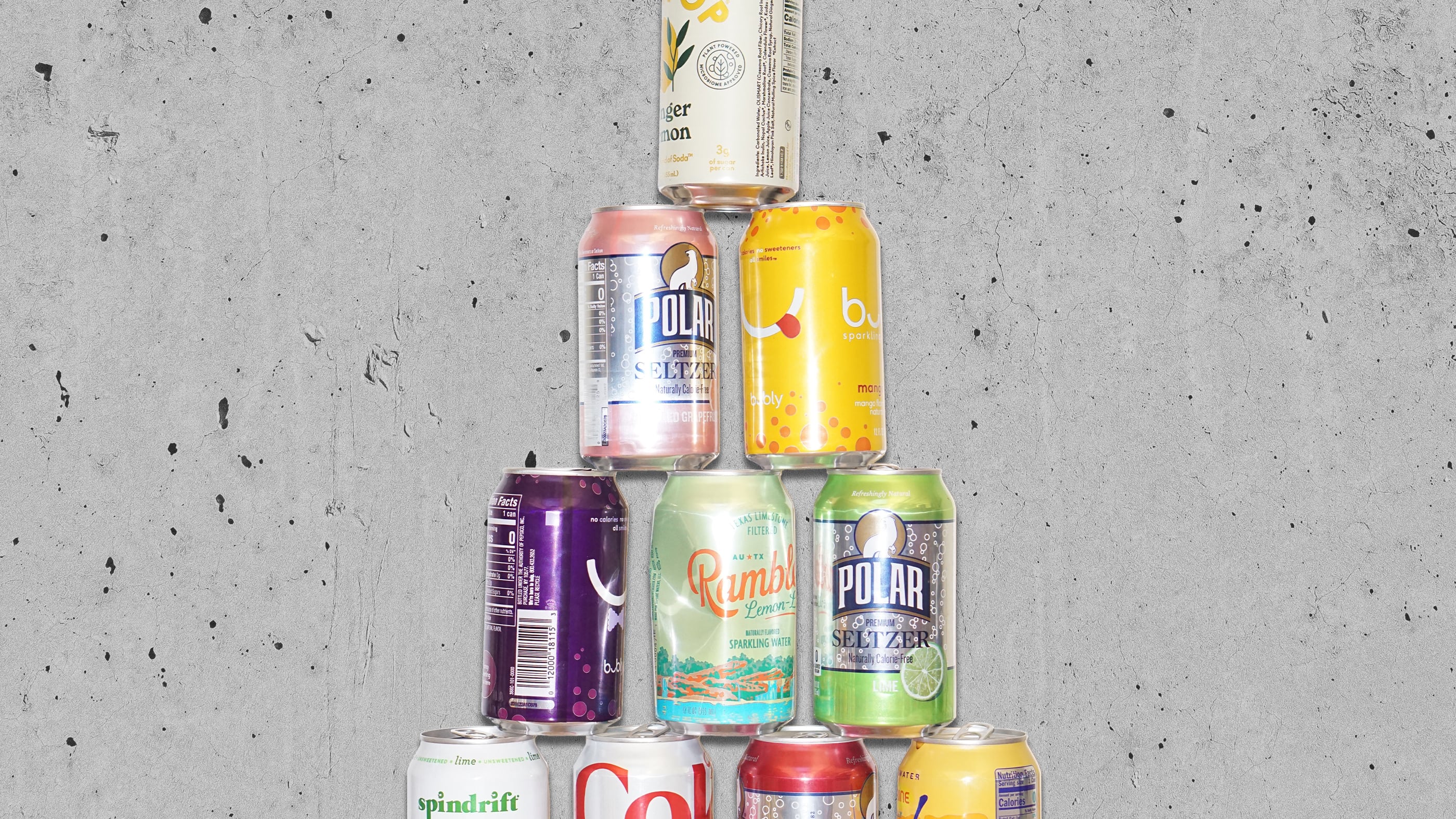On a recent Thursday morning, Luciano Garza stood in front of the Christian Science Reading Room at the corner of Southwest Columbia Street and 10th Avenue, struggling to do two things: stand up and get a flame under the foil that held his fentanyl.
Within two blocks, half a dozen other people sprawled on the sidewalk, some sparking lighters under foil like fireflies, others slumped as if comatose.
Across 10th Avenue is the Safeway that serves as a de facto bank for Garza and a ragtag army of “canners” who lug aluminum cans and glass bottles into the dungeonlike bottle return in the underground parking garage. They emerge from the store with small bills and change, plenty to buy the synthetic opioid whose rock-bottom prices have fueled a public health disaster.
Garza, 22, says 50 cans buy enough fentanyl to get him through the day. (Safeway will take only 24 at a time, so he can share with others or go a block west to Plaid Pantry to redeem another 24.)
Garza woozily ate from a pint of Ben & Jerry’s Cherry Garcia without a spoon as he described his routine: crash on the street, look for cans, redeem them at Safeway, and buy more fentanyl. “It’s what we do,” he says.
It is this daily ritual that begins to explain why bottle returns have become an object of dread and a source of harm in cities across Oregon.
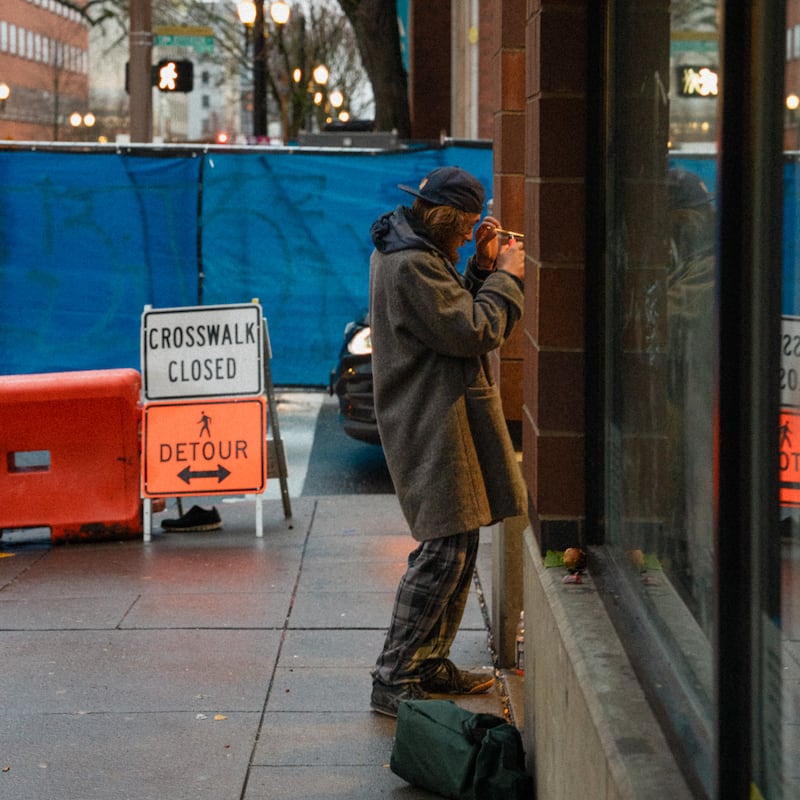
There may be nothing that better defines Oregon’s highest ideals than the Bottle Bill, the nation’s first and, by many measures, most successful recycling law.
Since Gov. Tom McCall shepherded the novel idea into law in 1971, it has kept Oregon roads and beaches largely free of single-use containers, enjoyed a redemption rate higher than in any other bottle bill state, and done so—as the system’s operator, the Oregon Beverage Recycling Cooperative, notes—at a cost of “zero taxpayer dollars.”
But as lawmakers prepare this month to consider a major expansion, some people question whether the Bottle Bill has drifted off course.
That’s because of two uncomfortable facts.
First, Oregon’s Bottle Bill has morphed from a law that serves its original purpose—environmental protection—to one that legislators claim has another benefit: offering a legal means of income for hard-up Oregonians, so much so that lawmakers now say that to change it would be to injure the state’s poorest citizens.
Second, as the price of fentanyl drops, there’s no quicker way to obtain a fix than by rummaging through trash cans and recycling bins for the few cans it takes to buy a single “blue.”
At a gathering of business leaders last year, then-Portland Police Chief Chuck Lovell told the group that the cans-for-fentanyl exchange was so routine that some dealers were even accepting cans instead of cash.
The thriving drug market outside downtown bottle returns played a role in two national retailers closing Portland stores. “We’re still having awful issues with the bottle bill,” wrote a lobbyist for one of them, Target, last June, three months before the retailer announced it would shutter its store in the downtown Galleria.
Taylor Cass Talbott, the co-director of Ground Score Association, which operates a canner-run redemption center under the Morrison Bridge in partnership with OBRC, says concerns about the Bottle Bill and fentanyl are misguided. “It’s a NIMBY argument and a distraction from the real issues—the lack of housing and economic opportunity for many people.”
To be sure, the fentanyl epidemic exists in states without bottle bills, and most canners probably don’t use the system to buy drugs. But the burden of the Bottle Bill falls disproportionately on inner-city stores, low-income neighborhoods, store clerks, and people in the throes of addiction—all while allowing the Oregon Beverage Recycling Cooperative, the organization that operates the redemption program with great precision to pocket hefty profits.
Ken Thrasher once served as the CEO of Fred Meyer, the state’s largest grocer. Now, in retirement, he’s become a neighborhood activist trying to convince lawmakers to rethink how the law works.
“In this state, we do public policy without all the facts, and we often don’t go back and assess outcomes or create a report card for what we are doing,” Thrasher says. “We have allowed the fentanyl crisis to get out of control—and the Bottle Bill is part of it.”
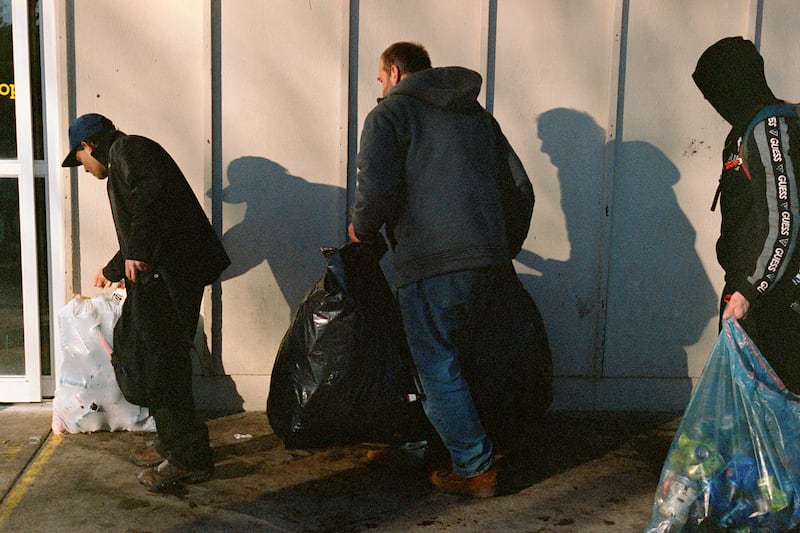
On Feb. 1, the Rite Aid drug store on Northwest 10th Avenue closed its doors for good. It shut down despite occupying an enviable location in downtown’s most prosperous neighborhood.
The closure, records show, came after numerous complaints to lawmakers, and to the Oregon Liquor and Cannabis Commission, which administers the Bottle Bill.
A Rite Aid customer named Lance Gilmore, for instance, expressed his frustration to the OLCC in a July 19, 2023, email.
Gilmore said he and his neighbors were fed up and worried the drugstore would shut down if the state continued to insist it accept empty cans and bottles for redemption, a condition the state sets on retailers larger than 5,000 square feet who sell beverages covered by the Bottle Bill.
“The crowd that forms on NW 10th Ave [outside Rite Aid] appears to be largely homeless fentanyl users,” Gilmore wrote. “Aluminum foil and straws to smoke fentanyl are easy to spot among the crowd.”
He concluded: “Please grant Rite Aid a waiver to the policy that requires them to operate a bottle return.”
Jim Helget, the OLCC’s Bottle Bill manager, told Gilmore that wasn’t going to happen. He suggested working with police and local officials, in addition to contacting lawmakers.
Thrasher, who lives in the Pearl District and heads Northwest Community Conservancy, says he and others have tried that and more. Police responded to about 250 calls for service at the Rite Aid last year, as the NW Examiner first reported.
Thrasher suggested that Rite Aid reduce the size of its store to get under the threshold for taking cans and bottles back: If it were less than 5,000 square feet, its obligation would shrink from 144 containers per person per day to just 50.
Thrasher, whose group does regular trash pickup, says the Bottle Bill now often has the ironic effect of leaving the landscape strewn with garbage. Pointing to a trash can around the corner from Rite Aid, he notes that it and other trash cans in the city get repeatedly rifled through, every day, their contents strewn on the street.
Adds Thrasher, “Let’s face it: We’re funding part of the drug trade with the Bottle Bill.”
Eli Arnold is running for Portland City Council in part because of what Thrasher describes.
In his day job, Arnold is a bike cop for the Portland Police Bureau. He and his colleagues are responsible for patrolling downtown and Old Town. Over the past two years, he says, he’s arrested about 70 fentanyl dealers.
“There is a nexus between cans and bottles and drug use and sales,” Arnold told WW in an off-duty interview, in which he spoke for himself and as a candidate, not as a representative of the Police Bureau.
“The connection became clearer when prices dropped to a dollar a pill,” Arnold says. “Then, you are only talking 10 cans.”
There have always been drug dealers downtown, of course, and the Bottle Bill is more than 50 years old. What’s different today is that fentanyl is extraordinarily cheap—and addictive.
Cheap fentanyl not only made scavenging for cans and bottles more attractive, Arnold says, it encouraged the long-standing practice of shoplifting cases of bottled water, dumping the liquid in a gutter, and redeeming the empties.
As a would-be policymaker, Arnold is critical of lawmakers’ reluctance to consider changing the Bottle Bill in ways that might reduce drug dealing and consumption.
“The Bottle Bill is not an effective part of the social safety net,” Arnold says. “Sure, many people are using the money legitimately, but many are using it to harm themselves. There’s a fine line between helping people and enabling them.”
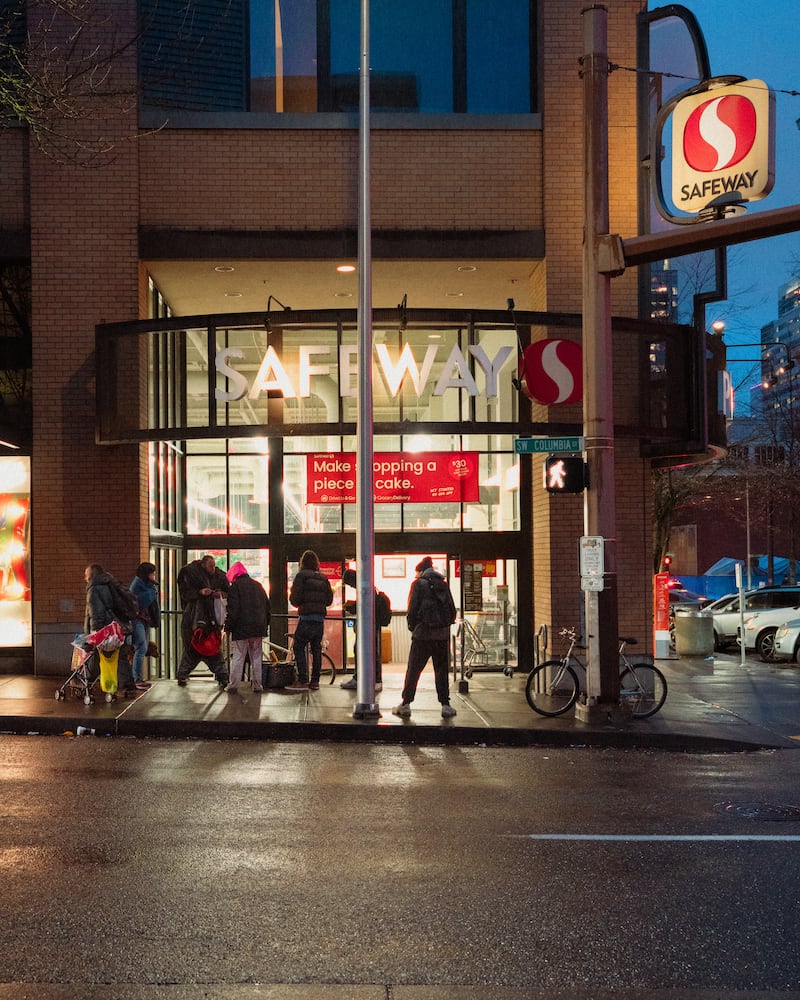
Emails WW obtained through a public records request show that Thrasher elevated the neighborhood’s concerns to Gov. Tina Kotek’s chief of staff, Andrea Cooper, then to her public safety adviser, Constantin Severe.
“Government is essentially funding drugs,” Thrasher wrote to Severe on Oct. 9. “The place is a disaster and garbage is everywhere.”
Internal OLCC emails show the issue heated up fast. The agency’s government affairs director, Rosie Shatkin, told Helget that Sen. Elizabeth Steiner (D-Portland), whose district includes Northwest Portland and much of downtown, was being “inundated with emails” about the Bottle Bill.
Emails show that Steiner and the House member responsible for Northwest Portland, Rep. Maxine Dexter, brushed constituents’ concerns aside.
One of those constituents, Marc Abrams, a union leader at the Oregon Department of Justice and former chairman of the Democratic Party of Oregon, is exactly the kind of person you’d expect to support the Bottle Bill. In an email to lawmakers, Abrams even noted he worked to help pass Connecticut’s bottle bill more than 40 years ago.
“The issue is not whether the Bottle Bill is good or bad,” Abrams wrote. Instead, he contended, the issue was that the regulatory language was facilitating dangerous street conditions.
“This circumstance is not organic, it is not natural,” he continued. “It was created by government. So that begs the question: What is our government going to do about it?”
The answer from Steiner’s and Dexter’s offices: nothing.
Abrams got a response similar to the one that other legislators expressed to WW: The law that began as an anti-litter exercise is now an essential part of the social safety net.
“Rep. Dexter is a strong supporter of bottle redemption and is also supportive of people supplementing their incomes by collecting and redeeming bottles and cans,” Dexter’s aide, Mie Kumin, told Abrams in a Sept. 6 email. “This is a win-win for the environment and for community members struggling to make ends meet.”
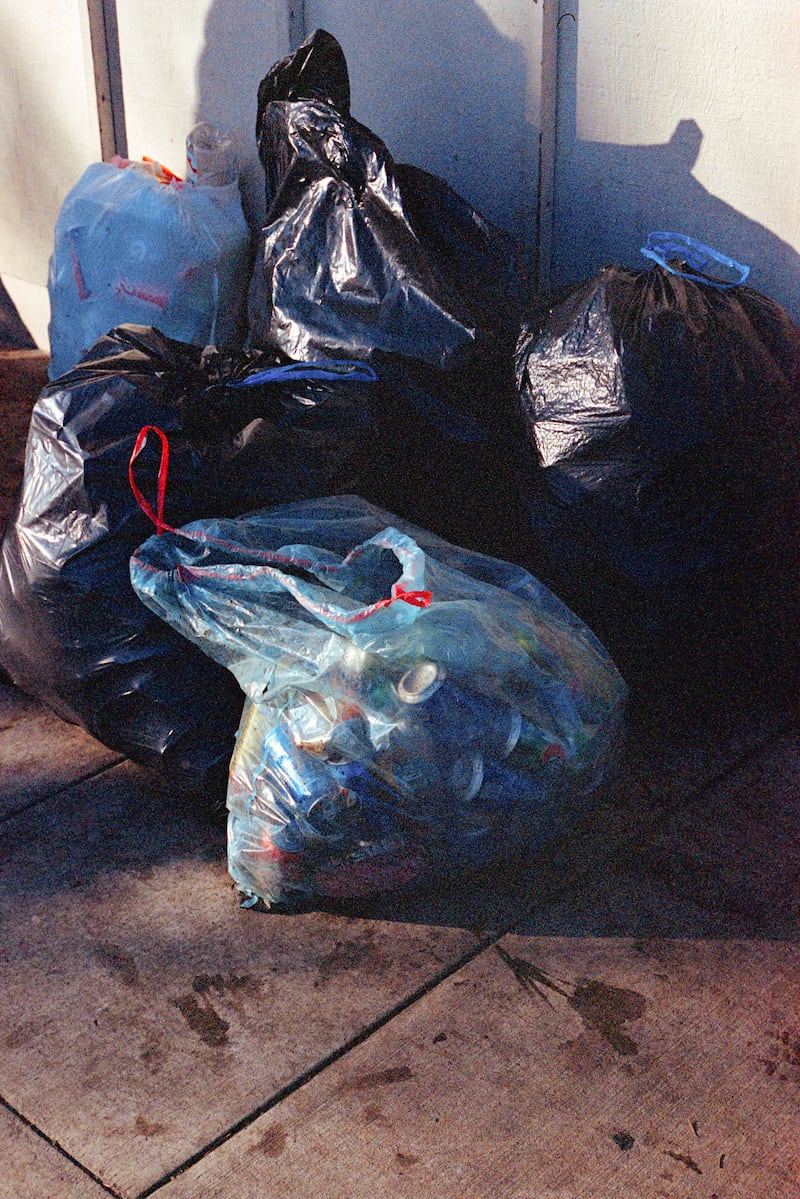
Rep. Pam Marsh (D-Ashland) chairs the House Committee on Climate, Energy and Environment, which shares oversight of the Bottle Bill with the Senate Committee on Energy and Environment. Like Sen. Janeen Sollman (D-Hillsboro), who chairs the Senate committee, Marsh has heard complaints about the connection between cans and fentanyl, but she is more worried about the people who depend on cans for legitimate needs.
“I think it is a form of social safety net,” Marsh tells WW. “Would it be better if we had better jobs or guaranteed incomes? Of course. But the fact is, people are standing at grocery stores in my district and using that money to buy food.”
Marsh says she sees and hears people tossing the trash cans and recycling bins in Ashland over and over. But that’s a symptom of a larger problem, she says, not the problem itself.
“Many people are desperate,” Marsh says. “People are using cans and bottles to pay for infusions or other necessities. Our economy is hard on poor people.”
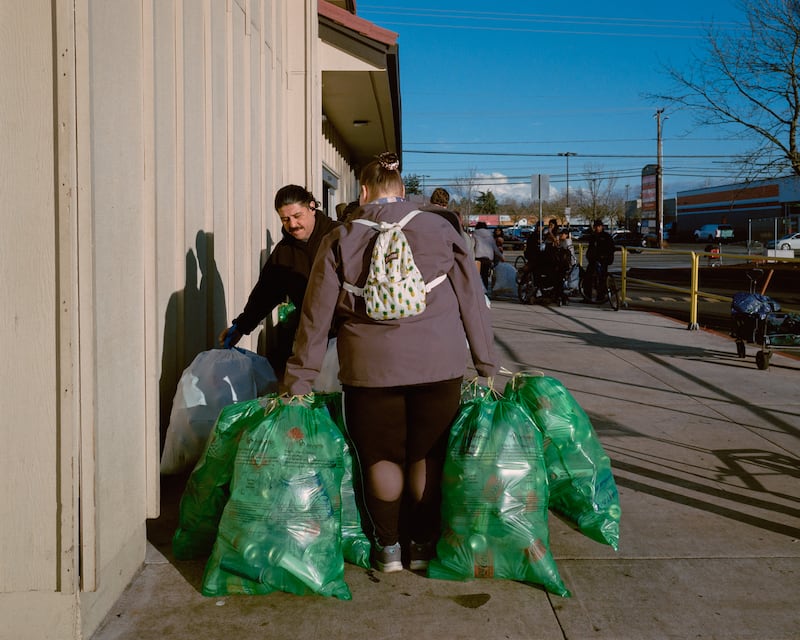
In the 40 states that don’t have bottle bills, the government finds a way to support the neediest, usually in ways that are more considered than the parade of canners arriving daily at 555 NE 122nd Ave. There stands one of the busiest establishments on the Hazelwood neighborhood’s commercial strip—a spare, putty-colored OBRC BottleDrop redemption center where customers come not to spend money but to get it.
From every direction, ramshackle, often unregistered vehicles fill the parking lot. Canners arrive by bus, in wheelchairs, and on foot, pushing fully laden shopping carts, dragging garbage bags, and rolling suitcases full of empties.
On a recent rainy morning, Nicole Hawkins, 46, pulled bags of cans from under a bulging weathered tarp atop a dented SUV.
Hawkins says cans are a simpler, more reliable source of income than public benefits. “I spent a couple of days in some waiting room trying to get food stamps,” she says. “Nothing happened.”
Timothy Nelson, 49, an unemployed machine operator walking out of the BottleDrop with a $20 bill clutched in his hand, says he’s been canning for as long as he can remember. “It’s a legit way to make money, and you’re not hurting anyone,” he says.
Nathan Williams, 39, a sometime carpenter, arrived with a full shopping cart. Williams says he knows some people think canners are a nuisance, but he says the deposits they collect prevent worse outcomes. “It stops people from stealing,” he says.
State Rep. Andrea Valderrama (D-East Portland), whose district includes the 122nd Avenue BottleDrop, says the facility is a force for good.
“The BottleDrop in outer East Portland has strong community partnerships and a commitment to connecting people to needed social services, while minimizing the impacts of foot traffic on the Hazelwood neighborhood,” Valderrama says.
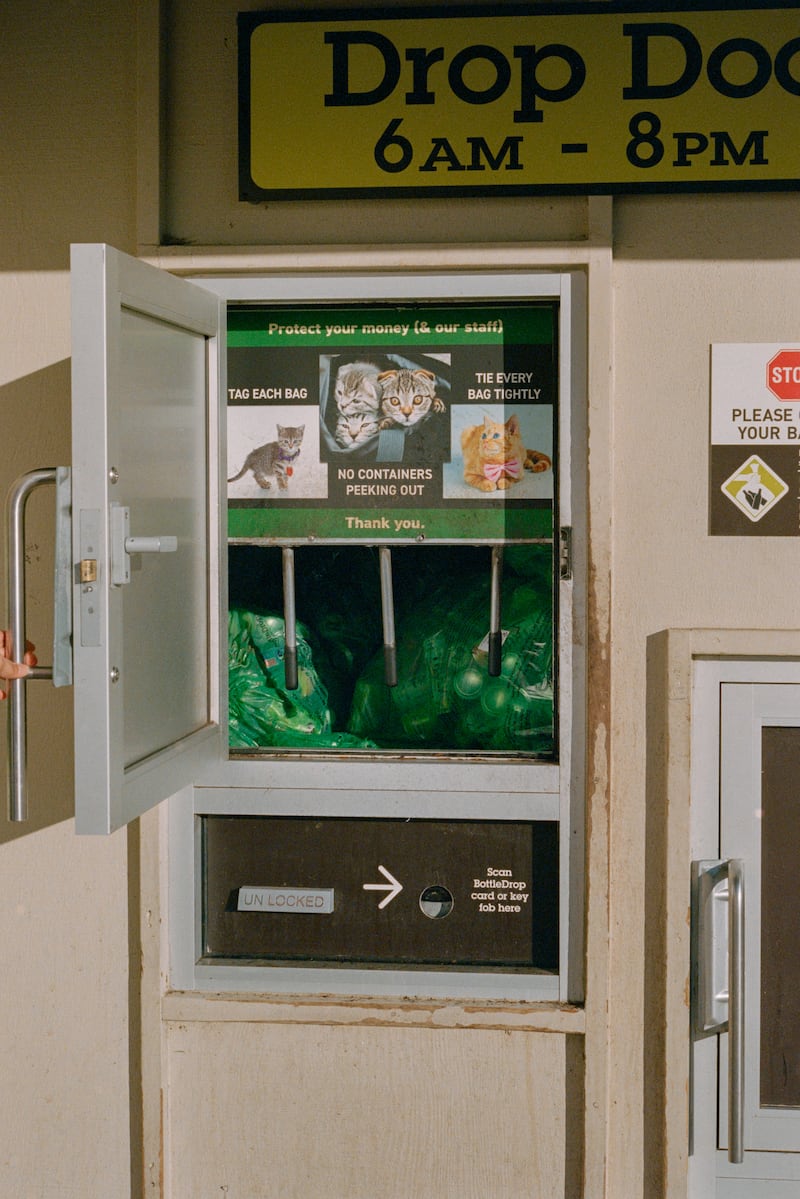
At the other end of the economic ladder from canners, the Bottle Bill pays tidy dividends to companies that distribute Coke, Pepsi, Miller Beer and Bud Lite, along with just about every other canned and bottled beverage.
Oregon differs from peer bottle bill states in a key way: Only two states, Oregon and Iowa, allow the system operator (OBRC, in Oregon’s case) to keep the deposits from unredeemed containers. Other states use that money for a variety of public purposes.
The way it works in Oregon: If you buy a six-pack, the retailer collects 60 cents in deposit and passes it along to the distributor (which, in nearly all cases, is a member of the OBRC co-op). If you return the cans, you get your 60 cents back. But if your cans never get returned, OBRC keeps the money.
All the unredeemed containers added up to a big number in 2022: about $33 million, or 60% of OBRC’s $54.85 million budget. Although it operates for public benefit, the co-op is a taxable corporation. Under Oregon law, it can also pay dividends—i.e., profits—to its owners.
Historically, lawmakers and other elected officials, including Secretary of State Phil Keisling and Gov. John Kitzhaber, have made attempts to grab the unredeemed deposits for public purposes, but never with any success.
OBRC publishes little financial information. It reveals its total annual expenditures, but unlike 501(c)(3) nonprofits, it gives no detailed information about its revenues, or profits.
The co-op’s revenue, according to industry sources and WW’s calculations, comes from unredeemed deposits, grocers who pay fees to support offsite BottleDrop centers, an assessment on distributors, and fees from the green bag system, which allows more than 1 million households expedited drop-off.
The volume of containers the co-op redeems is only a matter of public record because WW previously appealed to the Oregon Department of Justice to force its release.
For some, OBRC’s opacity is a source of frustration. “The state mandated the Bottle Bill, and all consumers pay into it,” says former House Majority Leader Barbara Smith Warner (D-Northeast Portland), “yet there’s no transparency on how the money flows.”
Smith Warner contrasts OBRC with the Energy Trust of Oregon, which was created by the Legislature, is funded by a surcharge on Oregonians’ utility bills, and is three times the size of the co-op yet publishes detailed financial reports. “Energy Trust’s budget is an open book, yet we can’t get a peep about OBRC’s financials,” Smith Warner says.
There is, however, a tantalizing footnote in the co-op’s annual report, first highlighted in a 2020 audit by the Oregon Secretary of State’s Office. “OBRC does not include the value of scrap material sold in its operating budget,” the footnote says.
Underneath that dry one-liner is what amounts to an aluminum mine.
Last year, OBRC redeemed 1.2 billion aluminum cans, which industry sources say had a scrap value of about $30 million and perhaps more.
That’s a dividend—pure profit—for the beverage distributors who own OBRC.
“It’s a slush fund,” Smith Warner says. “I’d like to see it used for public purposes, like treating substance abuse or helping to pay for housing.”
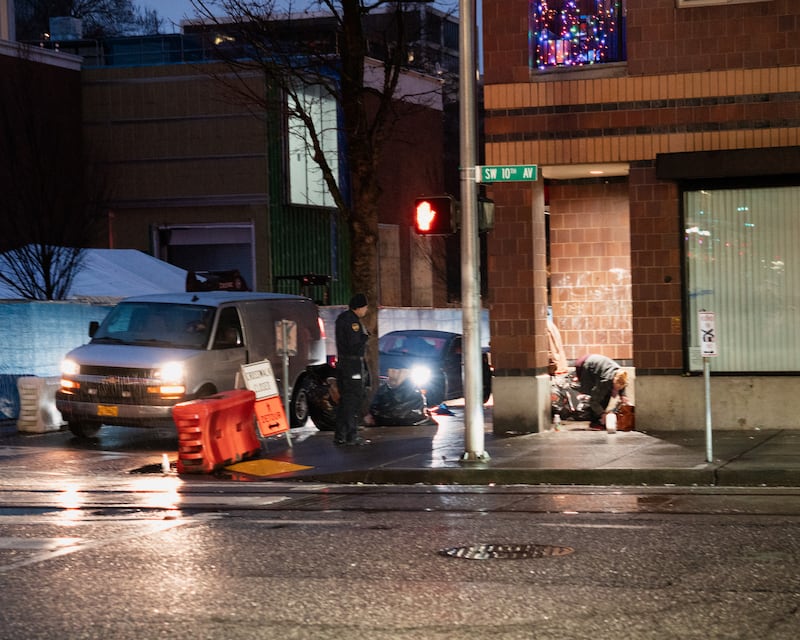
Others have suggested that OBRC beef up security at the massive BottleDrop centers, or partner with treatment providers to offer services to the often desperate clients who bring their bags to the co-op. In Portland, businesses have urged OBRC to consider investing in a central BottleDrop that could take pressure off retailers.
Mayor Ted Wheeler’s economic development director, Andrew Fitzpatrick, says he has received complaints from numerous businesses about the Bottle Bill but has had no success in getting help.
“Although we have proposed temporary relief to the OBRC, it appears that they are not willing or able to offer exemptions or meaningful flexibility in the face of this crisis,” Fitzpatrick says.
OBRC spokesman Eric Chambers says his organization is doing what the Legislature tells it to, as fairly and efficiently as possible. He says it’s wrong to blame the middleman—in this case, OBRC—for the behavior of people over whom it has no control.
“Until the state meaningfully addresses the addiction epidemic, these issues are likely to persist whether or not stores accept beverage containers,” Chambers says. “We see that in cities like Seattle, where there is no bottle bill in place but public drug use in commercial areas is still a major issue.”
Chambers declined to say how much the co-op makes from scrap aluminum sales.
“OBRC does not use value from scrap material in its operating budget because it is volatile as a revenue stream and values vary wildly between container types,” Chambers explains, adding, “OBRC does not report the value of scrap material due to the proprietary and confidential nature of its relationships between co-op members and the end markets into which material is sold.”
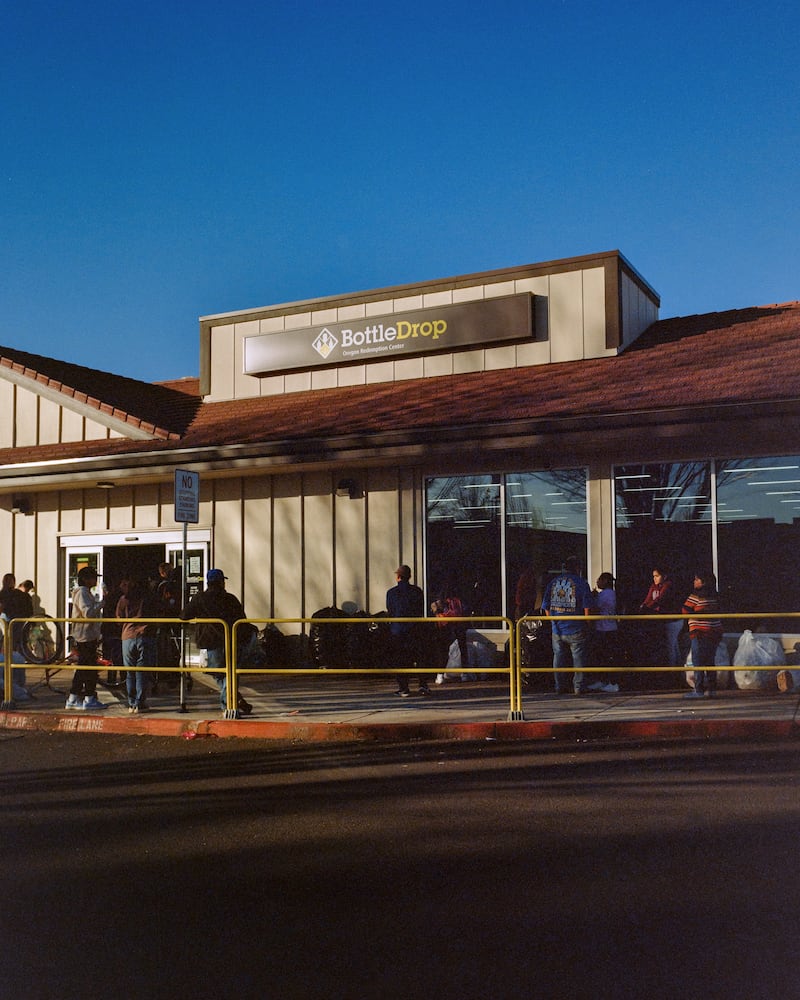
Critics say one way to break the relationship between cans and fentanyl is to stop giving cash back for deposits. Make the cans-to-fentanyl conversion harder, they say, and the stores and surrounding neighborhoods would face less drug dealing.
Thrasher, Jason Brandt of the Oregon Restaurant and Lodging Association, and others suggest taking cash out of the equation.
“In our minds, a cash redemption system could be replaced with some type of credit for food essentials redeemable at participating outlets,” Brandt says. “Such a solution could have a considerable impact on eliminating cash flow currently swirling around the drug trade.”
Brandt adds that his members hope to push lawmakers and Gov. Kotek to consider the idea. Dr. Andy Mendenall, the CEO of Central City Concern, the city’s largest social services nonprofit, says it’s worth trying.
“There are many secondary economies which exist among struggling individuals in our community, including those with substance use disorders. This certainly includes canning as a way to earn money,” says Mendenhall, an addictions specialist. “It makes sense to empower businesses and neighborhoods to offer an alternative to cash payment for individuals returning cans. This is a reasonable response.”
In the meantime, things are getting better in parts of downtown, ironically, because businesses have failed.
“In several recent cases, the closure of a store that had offered BottleDrop appears to have actually improved the safety and livability conditions in the surrounding area,” mayoral adviser Fitzpatrick says.
Steve Herring, the CEO of Living Room Theaters three blocks north of the Galleria, says the West End got better after Target closed, but the problems moved to the Safeway on Southwest 10th Avenue.
“Rather than directly address the problem of getting people service, health care, and onto a path to housing and back into society, we create these side routes that don’t make any sense,” Herring says. “Once the Bottle Bill was a way to keep the environment clean and promote recycling. Now, it’s chaos.”
